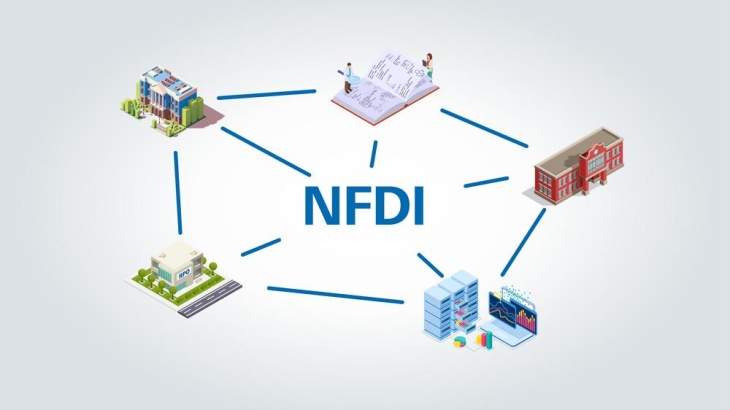Making research data transparent and sustainably available
In a collaborative effort to tackle the enormous challenge of building a common National Research Data Infrastructure NFDI, entire research areas across Germany are working together in subject-specific consortia. A total of ten consortia have now been approved and will receive five years of funding from the Joint Science Conference (German: Gemeinsame Wissenschaftskonferenz GWK). Researchers from the Helmholtz-Zentrum Hereon are involved in three of the consortia.

The NDFI connects existing research data services. Image: DFG
The GWK is thus following the recommendation of the NFDI expert panel appointed by the German Research Foundation DFG. The funding runs from October 2021 to September 2026. A total of 18 consortia applied for funding in various scientific areas in this second round of calls for proposals for the National Research Data Infrastructure NFDI in a competitive process, 10 of which were recommended for funding.
DAPHNE4NFDI
DAPHNE4NFDI (DAta from PHoton and Neutron Experiments for NFDI) is an initiative of more than 5500 neutron and photon users in Germany coming from a wide range of different disciplines. This community is facing the common challenge of coping with the increasing need for rapid analysis of large amounts of data and data transfer rates. DAPHNE4NFDI is led by the German Electron Synchrotron DESY. From Helmholtz-Zentrum Hereon, scientists Dr. Sebastian Busch and Dr. Jörg Hammel are involved as co-spokesperson.
In the field of photon and neutron research, more than 28 petabytes (PB) of data are currently produced each year by researchers at large-scale research institutions, with some individual experiments generating over one million data files. In order to be able to analyse this data quickly, efficiently and completely - if possible during the experiment - a new generation of data handling infrastructure is needed. Making data sustainable also requires new working concepts. This includes searchable catalogues for data and analysis tools in addition to the recording of as many parameters as possible in digital form during the experiment (electronic lab books). DAPHNE4NFDI unites scientists at universities, research institutes, large-scale facilities and industry with the goal of addressing these challenges of digital transformation in the field of photon and neutron research. As a major source of research data, DAPHNE4NFDI is one of the consortia helping to build the National Research Data Infrastructure under the umbrella organisation NFDI e.V. and is connected to the international landscape, particularly within Europe through LEAPS, LENS and the European Open Science Cloud initiatives.
Press release about DAPHNE4NFDI
NFDI-MatWerk
The NFDI-MatWerk consortium, coordinated by the Fraunhofer Institute for Mechanics of Materials IWM, consists of experts from the fields of materials science and materials engineering as well as mechanics.One of them is Prof. Dr. Erica Lilleodden, Head of Experimental Materials Mechanics Department at Helmholtz-Zentrum Hereon.
The envisioned digital data space infrastructure must be able to map the various highly complex interrelationships between different materials data and be as seamless to use as possible in order to enable synergy effects. Data from the scientific groups distributed across Germany and beyond should be accessible via a so-called knowledge-graph-based infrastructure. That will allow fast, complex search queries and data evaluations to find new correlations. Such a technical achievement will also provide an excellent basis for next-generation artificial intelligence in the field of materials engineering. As a research community, we see NFDI-MatWerk as a unique opportunity to bundle the numerous activities in the field of research data management, thereby increasing the scientific productivity of researchers.
Press release about NFDI-MatWerk
NFDI4Earth
The NFDI4Earth consortium is an essential component of the overall NFDI and integrates leading German institutions in Earth System Sciences. It comprises more than 50 institutions, including Helmholtz-Zentrum Hereon with Ulrike Kleeberg, Head of the Helmholtz Coastal Data Center. TU Dresden coordinates NFDI4Earth.
NFDI4Earth takes care of the digital needs of researchers in Earth System Sciences. A multitude of sensor and simulation data in very high spatial, temporal and thematic resolution leads to rapidly increasing data volumes. The description and assessment of Earth system processes, their interdependencies and changes therefore urgently require efficient research data management as well as more powerful collaboration environments for joint, cross-disciplinary data analysis.
NFDI4Earth website
About NFDI
Founded in 2020, the National Research Data Infrastructure (NFDI e.V.) is a coordinated, science-driven initiative to make research data from the German science system accessible, networked, and usable in the long term. The NFDI is organised as a network of independent consortia that are selected for funding by the federal and state governments in a competitive process in three application rounds and then funded for up to ten years each.
The national research data infrastructure is intended to systematically develop, sustainably secure and make accessible the data holdings of science and research and to network them (inter)nationally. It will be established in a process driven by the scientific community as a networked structure of consortia acting on their own initiative.
Mehr Infos auf den Seiten der DFG
Contact
Phone: +49 (0) 89 289-10764
E-mail contactWebsite
Institute of Materials Physics
Helmholtz-Zentrum Hereon
Phone: +49 (0)4152 87-2550
E-mail contactWebsite
Institute of Materials Mechanics
Helmholtz-Zentrum Hereon
Phone: +49 (0)4152 87-1583
E-mail contactWebsite
Institute of Carbon Cycles
Helmholtz-Zentrum Hereon
Communication and Media
Helmholtz-Zentrum Hereon
